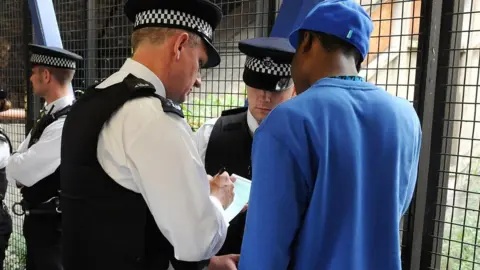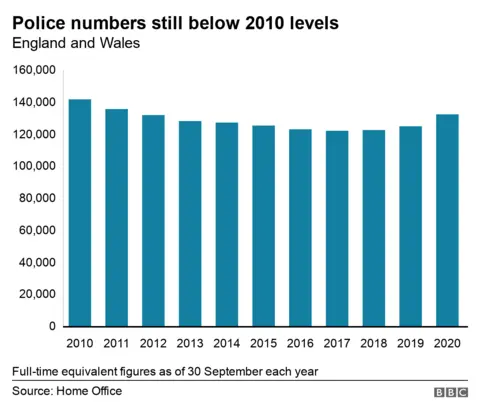Boris Johnson pledges to to target crime and anti-social behaviour
Prime Minister Boris Johnson has suggested electronic tagging on more burglars after release, and wider use of public "chain gangs", as measures to combat crime and anti-social behaviour.
The government is also proposing that every neighbourhood in England and Wales should have a named police officer for residents to contact.
The PM said it meant victims could speak to someone who knew the area.
The Police Federation said fighting crime needed greater investment.
And Labour accused the government of being "all talk and no action" on law and order.
Boris Johnson also said he wanted to see hi-vis "chain gangs" as punishment for anti-social behaviour.
"If you are guilty of anti-social behaviour and you are sentenced to unpaid work, as many people are, I don't see any reason why you shouldn't be out there in one of those fluorescent-jacketed chain gangs visibly paying your debt to society," he said.
Under the Beating Crime Plan, more burglars, robbers and thieves would have their location monitored with electronic tags 24 hours a day after leaving prison.
The document also says Project Adder - which targets drugs gangs, offers help to addicts and increases the use of drugs testing when arrests are made - will be expanded from five areas of England to 13.
The new areas covered will be Newcastle, Bristol, London's Hackney and Tower Hamlets, Wakefield, Liverpool, Knowsley and Wirral.
Stop and search
Ministers are also removing rules introduced by former Prime Minister Theresa May which made it harder for officers to use their section 60 stop and search powers.
The powers allow officers to search people without reasonable suspicion in places where serious violence may occur.
BBC home affairs correspondent Daniel Sandford says the change could prove controversial but the government believes limits on stop and search have held back efforts to tackle knife crime.
Also as part of a trial, probation services in Wales will be able to require prisoners released on licence to wear ankle tags for up to a year to monitor the amount of alcohol in their sweat.
Probation officers will be able to impose the tags where drinking alcohol is believed to increase their likelihood of committing another crime.
Currently, courts can only require offenders serving community sentences to wear the tags for up to four months for crimes explicitly linked to alcohol.
Like the court-ordered tags, prisoners on release will not be required to wear them if they are dependent on alcohol because those offenders are often required to undergo treatment.
The government's plan also includes:
- A pilot scheme to test the benefit of sending an officer to every reported burglary, to be trialled in Greater Manchester
- Proposals for league tables ranking how quickly police forces answer 101 and 999 calls
- More officers to deal with children truanting from school
- A £17m programme to persuade young people who attend hospital with a stab wound or come into contact with police to stay away from violence
- £45m for specialist teams in schools in places with high levels of violence
Speaking to reporters in Surrey, Mr Johnson said the government was "putting £15.8bn into supporting our police" - and he defended stop and search plans arguing that relieving someone of a dangerous weapon was "a kind and a loving thing to do" rather than a "strong-arm tactic".
He said plans for a named police officer for every neighbourhood would ensure that victims of crime could speak to someone who understood the local area.
"What you need is somebody who understands what's going on in your neighbourhood, who understands who the likely miscreants are, who understands whether the thing you are reporting - the crime that you are experiencing - is a one-off or part of a trend," he said.

Does stop and search work?
By BBC Reality Check
 PA
PAIt is far from clear that stop and search reduces violent crime. While it's often framed as acting as a deterrent, the figures don't bear this out.
A surge of section 60 searches in parts of London was brought in under a knife crime initiative called Operation Blunt 2. However, it had no effect on police recorded crime compared with boroughs where the searches were not brought in.
As the number of stops fell after the policy was reviewed in 2010, the proportion of stops resulting in an arrest rose. In other words, when the police could search more people indiscriminately they stopped many more people who weren't committing a crime.
If you stop and search a lot more people you do get an increase in the absolute number of arrests - but many argue the methods are disproportionate.
Last year, black people were nine times more likely to be stopped and searched as white people. Part of this is due to geography (more searches take place in big cities where there are also larger black communities) but even in London black people are still four times more likely to be searched.

Why are politicians focusing on crime?
By BBC political correspondent Pete Saull
On the prime minister's first day out of self-isolation, this is a clear attempt to seize the political initiative on an issue that's moving up the list of voters' priorities.
We've all spent more time than usual in our local communities over the past year and we're perhaps more aware than ever of crime and anti-social behaviour.
Indeed, surveys for the Office for National Statistics suggest a growing number of people believe crime levels are rising.
It's an issue that has been considered safe territory for the Conservative party in the past, but Labour, too, are trying to capitalise on voters' unease.
The shadow home secretary, Nick Thomas-Symonds, has accused the Tories of being "soft on crime"; an accusation that's traditionally gone in the opposite direction.
The debate is also a sign that the parties want to move the conversation on from the pandemic.
With the worst of the coronavirus crisis seemingly behind us, you can expect discussions about other subjects to rise up the agenda over the summer.

The announcement comes four days after the Police Federation declared it had no confidence in Home Secretary Priti Patel.
It described the planned pay freeze for all officers in England and Wales earning more than £24,000 a year as an insult.
And it delivered a letter to Downing Street on Tuesday objecting to the pay freeze and criticising the crime-fighting proposals.
"We don't need old ideas presented as new, we need genuine investment for the whole of the criminal justice system and genuine consultation over new ideas. Without that, this is just another ill-thought out initiative," the letter says.
'More gimmicks'
Labour said community policing had been "decimated" under the Conservatives.
Shadow home secretary Nick Thomas-Symonds said: "Coupled with an insulting pay freeze, it is no wonder frontline police have declared no confidence in the home secretary."
He said the prime minister was offering "more gimmicks and more slogans", and suggested that key proposals such as a named police officer for every victim of crime were already recommended by the College of Policing guidelines.
The government says its crime plan builds on progress already made, with 9,000 new officers hired of the promised 20,000 additional officers by 2023.
This follows a reduction in officer numbers since the Conservatives came to power in 2010.
Between March 2010 and September 2017 there was a fall in officer numbers in England and Wales of 21,805.
Police numbers have risen since then, but in the most recent set of figures for September 2020 they were still 11,267 below the level in 2010.
Former Metropolitan Police Chief Superintendent John Sutherland told BBC Newsnight: "During the decade of austerity, it wasn't just the numbers that we lost, it was the experience that went with it, it was the relationships with local communities that are the bedrock of local policing."
Policing Minister Kit Malthouse said the cuts had to be made in 2010 due to "the worst economic crash since the Second World War". He denied suggestions that a reduction in police numbers had led to a rise in crime.


Have you been a victim of crime? You can share your experience by emailing haveyoursay@bbc.co.uk.
Please include a contact number if you are willing to speak to a BBC journalist. You can also get in touch in the following ways:
- WhatsApp: +44 7756 165803
- Tweet: @BBC_HaveYourSay
- Upload pictures or video
- Please read our terms & conditions and privacy policy
If you are reading this page and can't see the form you will need to visit the mobile version of the BBC website to submit your question or comment or you can email us at HaveYourSay@bbc.co.uk. Please include your name, age and location with any submission.

- BREEDING FOR PROFIT: The consequences of Britain's puppy boom for the welfare of animals
- DIVE INTO SUMMER: The top ten ways to spend summer in the UK this year!

